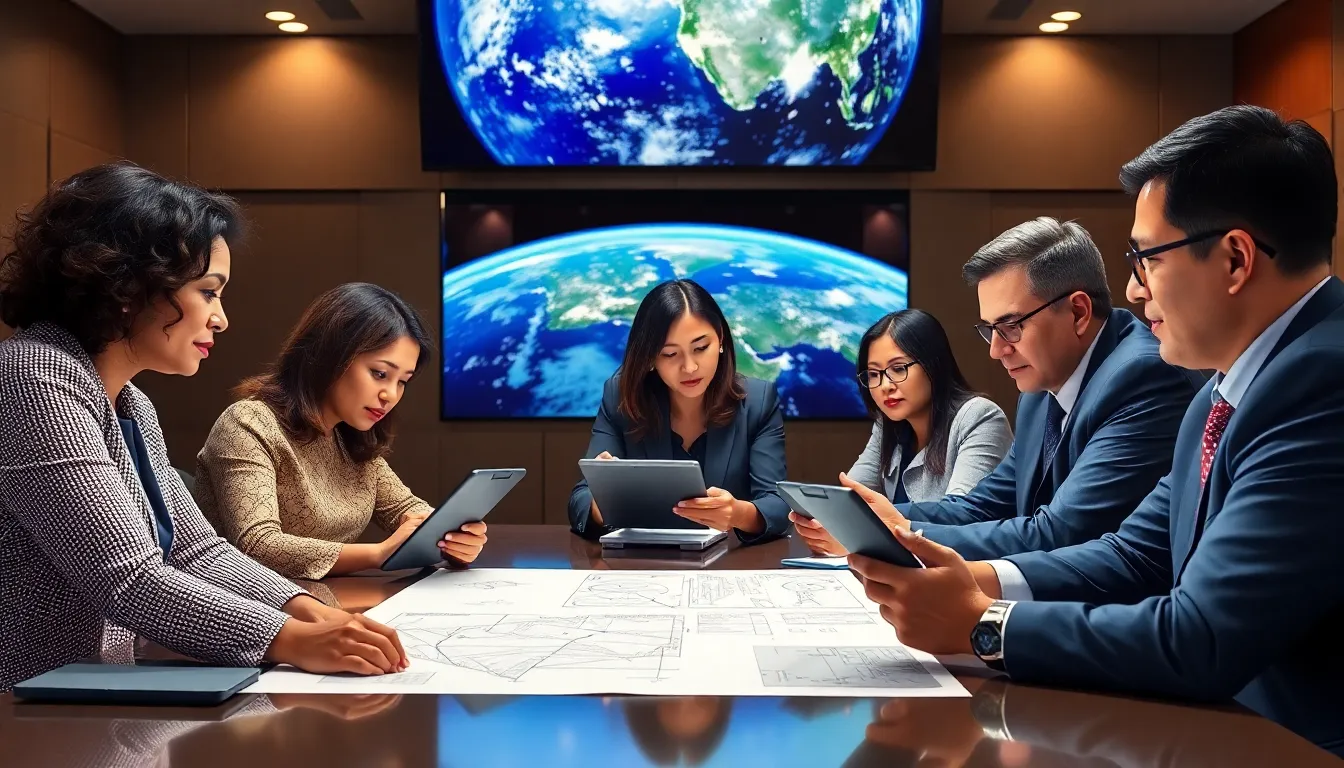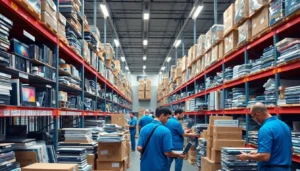When it comes to exploring the final frontier, the Science Space and Technology Committee is the unsung hero of innovation. Picture a group of bright minds, fueled by coffee and a passion for discovery, working tirelessly to push the boundaries of what’s possible. They’re not just staring at stars; they’re figuring out how to reach them.
Table of Contents
ToggleOverview of the Science Space and Technology Committee
The Science Space and Technology Committee plays a pivotal role in shaping the future of space exploration and technological advancements. This committee consists of experts in various fields who collaborate to address challenges and identify opportunities within space science. Each member brings unique expertise, contributing to innovative solutions that drive the mission forward.
Leadership within the committee focuses on legislative initiatives that promote the development of space programs. They advocate for funding that supports research, exploration, and technological innovation, ensuring that the United States remains at the forefront of space activities. Regular briefings and discussions allow the committee to evaluate current projects and respond to emerging needs in the field.
Committees actively engage with stakeholders, such as universities and industry leaders, to foster partnerships that enhance research possibilities. They also prioritize public outreach, educating citizens about the significance of space initiatives. Building public support strengthens the overall impact of space and technology projects.
Furthermore, the committee monitors global advancements in space exploration to inform U.S. policy. They analyze data and trends, allowing for informed decisions that align with national interests. Reports published by the committee provide insights into the progress of ongoing missions and highlight future goals for the space sector.
The Science Space and Technology Committee functions as a driving force behind exploration and discovery. Through constant engagement and innovation, it ensures that the journey into space continues to evolve, inspiring future generations of scientists and engineers.
Roles and Responsibilities

The Science Space and Technology Committee plays a vital role in shaping U.S. space policy and technological advancements. It engages in various functions that drive progress and innovation.
Legislative Functions
Legislative functions focus on creating and promoting laws that support space exploration and technology development. Committee members draft and propose legislation aimed at increasing funding for space missions and research initiatives. They advocate for policies that address emerging challenges while ensuring national interests are prioritized. By collaborating with lawmakers, the committee shapes strategic priorities that enhance the U.S. position in global space initiatives. Furthermore, they explore opportunities to enhance partnerships with public and private sectors, fostering collaboration that leads to groundbreaking advancements in space science.
Oversight Functions
Oversight functions ensure accountability and effectiveness within space programs and initiatives. The committee monitors the progress of various space missions and evaluates their alignment with established objectives. Members analyze budget allocations to ensure funds are utilized effectively for research and development. By conducting regular assessments and hearing testimonies from experts, they gather valuable insights on ongoing projects. Additionally, they report findings to Congress, providing recommendations that drive improvements and refine strategies. Their oversight guarantees that U.S. space endeavors remain innovative and efficient, aligning with national priorities and advancing scientific discovery.
Key Areas of Focus
The Science Space and Technology Committee emphasizes critical areas that propel advancements in space and science. This focus drives initiatives in space exploration, scientific research, and technology development.
Space Exploration
Space exploration stands as a central tenet of the committee’s mission. The committee advocates for robust funding to support missions that push beyond Earth’s atmosphere. Collaboration with NASA and private aerospace companies enhances capabilities and resources for ambitious ventures. They seek to address immediate challenges like asteroid mining and long-term goals such as crewed missions to Mars. Through periodic assessments, the committee monitors progress and ensures that objectives align with strategic national interests.
Scientific Research
Scientific research is integral to informing policies and driving innovation. The committee promotes research that leads to significant discoveries, including astrobiology, planetary science, and materials for space applications. Engaging universities and research institutions fosters collaboration for groundbreaking studies. Grant allocation often prioritizes projects with high potential for transformative results. Reporting on research outcomes helps highlight advancements and reinforces public support for ongoing initiatives.
Technology Development
Technology development fuels the evolution of space capabilities. The committee emphasizes emerging technologies that enhance communication, navigation, and propulsion systems. Partnerships with private sector firms facilitate rapid innovation and commercialization of advancements. These efforts align with legislative initiatives aimed at supporting research and development projects. By encouraging cross-sector collaboration, the committee drives technology that ultimately benefits both space exploration and terrestrial applications.
Notable Achievements
The Science Space and Technology Committee achieved significant milestones that advanced U.S. space policy and exploration. One achievement includes the successful advocacy for increased funding, which resulted in billions allocated to NASA for exploration initiatives. This funding enables research into advanced propulsion systems, expanding capabilities for future missions.
Collaboration with private aerospace companies marks another notable success. Partnerships have fostered innovations in launch technology, leading to reduced costs for missions and enhanced accessibility to space. By engaging industry leaders, the committee facilitates a synergistic environment that accelerates technological advancements.
In addition, the committee’s role in overseeing and evaluating ongoing space missions has proven crucial. By conducting rigorous assessments, it ensures missions remain on budget and aligned with national objectives. Reports generated have provided Congress with valuable insights into program effectiveness and areas requiring improvement.
The committee’s influence extends to public outreach, educating citizens on the benefits of space exploration. Events organized by the committee successfully highlight the importance of STEM education, inspiring future generations to pursue careers in science and technology. Their efforts in disseminating information help to foster a supportive public perception of space initiatives.
Focus on international cooperation also stands out among their achievements. Monitoring advancements in global space efforts allows the committee to align U.S. strategies with international trends, promoting collaborative projects that enhance scientific discovery. By prioritizing partnerships, the committee enhances the overall impact of U.S. space policies.
Lastly, the formulation of legislative measures that support groundbreaking research has led to transformative discoveries. Areas such as astrobiology and planetary science benefit significantly from these initiatives, pushing the boundaries of knowledge and establishing the U.S. as a leader in space exploration.
Challenges and Future Directions
Emerging challenges in space science and technology shape the committee’s agenda. Global competition pressures the U.S. to innovate rapidly. It encounters issues like budget constraints impacting the scale of space missions. Additionally, technological hurdles impede the development of new spacecraft and exploration systems.
Engagement with private sector partnerships remains crucial. Collaborations with commercial enterprises enhance the potential for groundbreaking advancements in space. They provide access to new technologies and expertise, ensuring efficient resource allocation.
Public interest in space exploration fluctuates, which can affect funding. Sustaining enthusiasm requires effective communication about ongoing missions and their benefits. Engaging the community through educational programs fosters long-term support.
The committee also monitors international cooperation, recognizing the value of shared knowledge and resources. Aligning U.S. policies with global strategies can lead to successful collaborative projects. Moreover, addressing environmental concerns in space, such as space debris, gains importance.
Fostering a comprehensive approach toward space technology ensures ongoing relevance. Investing in artificial intelligence and robotics strengthens capabilities for exploration and research. Engaging younger generations through outreach prepares future scientists and engineers.
Optimizing legislative initiatives becomes essential to support ongoing programs. Drafting policies that address critical challenges, such as climate change and technological advancements, positions them for success. Strategies must prioritize not only exploration but also scientific research to inform decision-making.
Strategically navigating these challenges enables the committee to maintain leadership in space initiatives. With a focus on innovation and adaptability, the committee can inspire future generations and advance the frontiers of space exploration.
The Science Space and Technology Committee stands at the forefront of U.S. space policy and exploration. Its commitment to advancing scientific research and technological innovation ensures the nation remains a leader in the global space arena. By fostering collaboration with both public and private sectors, the committee drives groundbreaking advancements that benefit not just space exploration but also terrestrial applications.
Through effective oversight and strategic advocacy, the committee plays a pivotal role in shaping the future of space initiatives. Its dedication to educational outreach inspires the next generation of scientists and engineers, ensuring continued interest and investment in space science. As challenges arise, the committee’s proactive approach will be essential in navigating the complexities of space exploration and technology development, ultimately pushing the boundaries of what’s possible.



